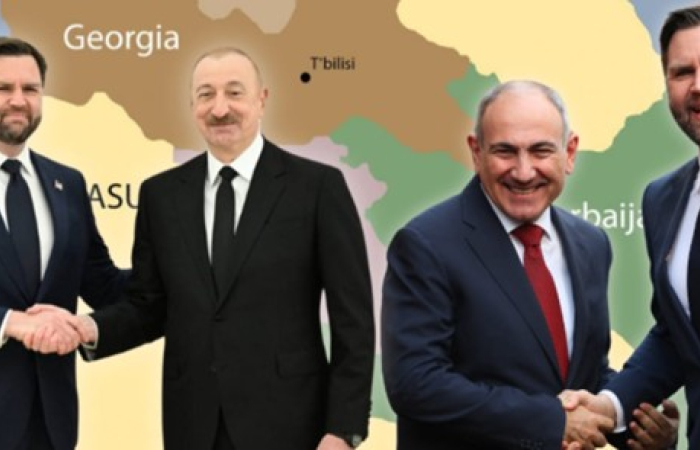ARMINFO News Agency Interview with former Foreign Minister of Nagorno-Karabakh Republic Arman Melikyan
In the Ramil Safarov case Hungary's motive is more or less clear, but what was the motive of Azerbaijan, who has in fact got involved in an international scandal as a result?
To a large extent, Safarov's case is just a supplement to the economic deal of Baku and Budapest. Actually, economic motives were what the Hungarian-Azerbaijan deal was based on. As for Safarov, he became a sweet dessert for Aliyev. After all, Azerbaijan has successfully placed its funds receiving additional external assets, which is very important from the economic point of view. It is favorable for Azerbaijan to have an open door to the EU economy and investments in foreign countries, in particular, in a EU member-state - Hungary, and receive dividends. Union of the political elite of Azerbaijan and the European elite will be just in favor of Baku. Armenia lacks such foreign economic relations, though, there were reports that someone bought a chocolate producer company, Gagik Tsarukyan acquired a company of mineral waters in Bulgaria, and another private has made investments in Georgia. However, the attitude of the Armenian public to such reports is negative, which is absurd. To balance the domestic economic situation, foreign investments and presence in foreign economies is a necessity. From this point of view, Baku's actions are quite reasonable and politically grounded. It is not surprising either that Aliyev tried to gain also political dividends through that deal.
Who of the big external players was most interested in such a turn in the Armenian-Azeri conflict?
Russia might be one of those interested in the release of Ramil Safarov as by releasing the murderer Azerbaijan has shown that it ignores Europe's values. Azerbaijan's values are incompatible with those of Europe, and the only reason why the Europeans are still cooperating with such a regime is their material needs. So, for the time being President Aliyev is on a roll, but at some moment he may signal to President Putin that having no common values with Europe, his country has ones with Russia. In this light, Moscow's late response to Safarov's release might mean that Putin's men might have a hand in it. Even though not all people in Azerbaijan support Aliyev in the matter, Safarov's image will certainly be used by Aliyev's regime to bring up a generation that will be easy to control.
Although Aliyev's step has made him more popular in his country, it is contrary to any principle of international diplomacy and law. Can we say that for Aliyev reproduction of power is more important that the interests of his country?
Should Europe display discontent, say, in 3 months and suddenly suspend relations with Azerbaijan, Aliyev will immediately go over the Russians' side. Consequently, one should understand that the action around Safarov was planned for these purposes. Meanwhile, the United States and Russia have probably entered into collusion on division of the spheres of influence, and according to that collusion the South Caucasus will be returned" to Russia. Today the initiator in the international policy is the American-British tandem. In this context, if Aliyev goes over to Russia's side without any scandal, this will happen in accordance with this collusion. But if a scandal arises and the West tries to keep Azerbaijan in the sphere of its influence, the West may also try to change the regime in Baku. Time will show which of these two scenarios will be launched in the game with Aliyev, because much will depend on when and how the civil war in Syria will be over.
What role does Armenia have in this scenario?
Armenia has done its best for the Russian presence in the South Caucasus to be restored. All the steps Yerevan has taken and is taking in the Karabakh peace process demonstrate that Armenia's leadership is preparing its people for the fact that if Azerbaijan agrees to recognize the independence of the NKR, Armenia will cede the territories. However, I consider that this bargain is going on between Azerbaijan and Russia, not Armenia and Azerbaijan. And the Russian politicians have repeatedly said that the only real formula of the conflict settlement is the formula of recognition of the NKR's independence in exchange for the territories. This exchange implies Russia's return to Azerbaijan and the deployment of the Russian military bases in Azerbaijan. This is the price of the deal based on the compromise. Very soon a lot of people will feel the negative consequences of implementation of this plan.
What consequences?
The intensification of the political pressure on Armenia and its political isolation from the West. The West may strengthen the pressure on Armenia in order to keep Azerbaijan in the sphere of its influence. I do not even rule out intensification of the pressure on Russia and Iran, speed-up of developments in Syria through the West's larger aid to the Syrian rebels. That is to say, the capacities of Russia and Iran will be reduced in the Middle East.
Russian experts keep saying that status quo in Nagorno-Karabakh benefits Russia. But your concept is contrary to what they say...
Yes, you are right, Russia is for preserving of status-quo around Nagornyy Karabakh or offers a compromising option of settlement, which is the only possible one for this conflict from its point of view. The status-quo does not suppose resolving of the conflict. It may be resolved on the basis of exchange of territories for the Karabakh status. However, this formula will not act, as it is dead. Unfortunately, since split of the USSR the Russian policy in South Caucasus has ended in a full fiasco. Russia lost Georgia and Azerbaijan and due to the way it has been acting in Armenia, there is a risk to lose our republic too. As for the Middle East, in case of losing Syria, Moscow will lose the whole region for a long period of time.
Then what is Aliyev's reason for taking Russia's side?
Transference of certain territories of Karabakh to Azerbaijan will not hinder Aliyev, especially if we take into consideration that time is running out and the Russians may use transitional options for the Karabakh conflict settlement. In this context, Aliyev has resources to go on buying time in the relations with the Russians so that to force them to impose pressure upon the Armenian parties to the conflict. However, there is a border for the Russians, crossing which they will lose their influence and presence in Armenia. As for Azerbaijan, they are not going to suffer the presence of the Russians there. For this reason, the Russians also have a certain resource of compromises on Karabakh. But taking in consideration the corruption of many functionaries, I think that the Russian corruption may play a part in the matter of the Karabakh conflict settlement too.
Summing up our conversation, who might be interested in the revival of the Ramil Safarov case?
Conceptually Ramil Safarov's release is aimed at separating the South Caucasus from Europe and at showing that the European values are not good for this region. Armenia has also spoiled its relations with Europe: it has not only cut its diplomatic ties with Hungary but has even reproached NATO and the European Union. This all will certainly separate Armenia and Azerbaijan from Europe, which will be good news for Russia.
What might the constant sabotage attacks on the border and the demarches like the release of a murderer be leading to?
I don't think that this may result in a new war in Nagorno-Karabakh but I do not rule out the possibility of bigger concessions on Armenia's part. In any case, they in Armenia keep scaring their people with war. For what purpose they are doing it will become known soon. One such purpose may be the entry of foreign peacekeepers.
by David Stepanyan
Wednesday, September 12







